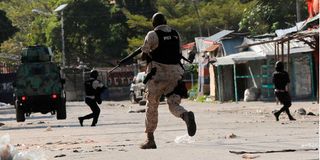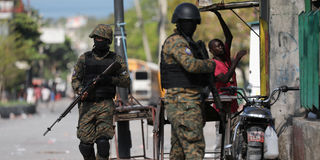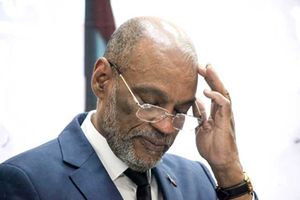
A gang member stands behind a barricade after former police officer Jimmy "Barbecue" Cherizier, and leader of an alliance of armed groups, addressed the media, in Port-au-Prince, Haiti, March 11, 2024.
They are both dangerous. They target the masses, using illegally imported weapons to maim and kill, usually to voice their grievances or settle political scores. But why are the armed groups in the Democratic Republic of Congo, for example, called 'rebels'? But why are those in Haiti called 'gangs'?
Security experts see both as threats to statehood. And political scientists and anthropologists say both are the result of bad governance. So why are they called 'gangs' in Haiti and 'rebels' in the DRC?

Former police officer Jimmy "Barbecue" Cherizier, and leader of an alliance of armed groups, speaks to a news outlet on a mobile phone during a news conference, in Port-au-Prince, Haiti, March 11, 2024.
The conditions under which these groups formed in these countries may be similar, but they never follow the same pattern. There are differences in the way they operate, but looking out for them is like picking hairs, the experts warned.
"I wouldn't worry too much about the definitions that are made in academic environments," said Dr Hawa Noor, an independent researcher and affiliated fellow at the Institute of Intercultural & International Studies (InIIS) at the University of Bremen.
"Some of them don't really hold water and we don't need a philosophy of what is what. These are just loose terminologies from a Western perspective," she said, speaking generally about the classification.

Police officers run holding their guns while confronting a gang during a protest against Prime Minister Ariel Henry's government and insecurity, in Port-au-Prince, Haiti March 1, 2024.
Indeed, the Western perspective has blurred the line on how to refer to these leaders of armed groups. Some have been labelled terrorists, only to emerge to their followers as freedom fighters.
Himmler Rebu, a Haitian security expert, told the Nation that gang violence signals deeper problems in Haitian governance.
"The criminal groups operating in Haiti," he said, "are not autonomous entities."
"Their visible activities, which are very harmful to the people, are just the tip of the iceberg. Their real leaders are hidden at the heart of the state's political-financial complex, which is linked to large foreign countries," he said in an interview with the Nation.

Police officers patrol as Haiti remains in state of emergency due to the violence, in Port-au-Prince, Haiti March 9, 2024.
To understand that, he said, you also have to know:
- Where they get their weapons
- Who controls the billions of products they trade and their activities
- Why foreign police have to be brought in to solve a problem that is not local.
"The Haitian drama is a cover-up. The state has never done anything to solve this problem".
In Haiti, one of the gang leaders was actually a former police officer. Known as Jimmy "Barbecue" Chérizier, he had called for the overthrow of the country's unpopular leader, Ariel Henry, and the liberation of its 11.7 million people. Henry resigned on Monday night. And a senior State Department official told journalists on Wednesday that a new interim government could be in place before the weekend.
David Monda, a professor of political science at the City University of New York, says the terms rebels, militias or gangs can be used interchangeably and still mean something different in context.
In fact, Dr Noor says most groups that end up being labelled terrorists or rebels start out as gangs and evolve into something bigger.
"It sort of evolves. It could evolve into a rebel group; you know, there is no formula that a rebel group uses to form itself," she told the Nation on Wednesday.
"These ones, in Haiti, sort of came out of a situation that allowed these groups to form. Some of the members were part of a political formation, but that didn't mean they were in some kind of rebellion."
They end up with the same effect: bloodshed. In Haiti, nearly 4,000 people were killed and 3,000 kidnapped in gang-related violence in 2023, according to UN figures, which also show that more than 1,100 women were raped and more than 300,000 displaced. This is more than the 2,750 deaths reported in the DRC in 2023 from rebel-related activities.
In terms of origin, whether gangs or rebels, armed groups are often born out of some form of grievance. In the Democratic Republic of Congo, a sense of marginalisation and external interference has given rise to more than 120 armed groups. In Haiti, a history of 220 years of independence, forced reparations by France, dictatorships, coups, assassinations and other forms of external interference have combined to breed gang violence.
Like the situation in eastern DRC, the solution in Haiti lies in addressing grievances and some form of political negotiation or inclusion, Dr Noor advised. But Haiti's security situation isn't like that of eastern DRC.
"They don't have a strong political ideology. They sort of use criminal activities to get money," Dr Noor observed.
"They're not really an organised militia group, but they could become one if they don't take measures to prevent it. This is how al-Shabaab was formed, this is how groups develop, and then they start getting money from foreign donors who see the gangs as an opportunity."
Prof Monda says the gangs in Haiti are different from ordinary rebels, such as those in the DRC, right down to their organisation. Some of the gangs in Haiti don't have a known leader and "a rebel group is more organised than a gang. They have a clear political, socio-economic or revolutionary objective for the total regeneration of a society," he told the Nation.
Some of the rebel groups, such as the National Resistance Army (NRA), have become formal military forces and political parties in their countries. Others include the Sudan People's Liberation Army and the Rwandan Patriotic Front. After conflicts, they have been transformed into mainstream armies with a defined structure and professional code of conduct.
"They will engage in guerrilla activity to frustrate the government and force it to overreact in brutality towards the citizens, thus gaining more followers for the rebels/militia. They are strategic in their attacks and have long-term goals.
Gangs such as those in Haiti, he argues, are simply "taking advantage of the lack of central authority or legitimate government" to gain material benefits for themselves, with no long-term goal for the country or region. A gang may also be formed as a self-defence force by citizens against the police or rival gangs. Overall, gangs tend to have less organisation, firepower, staying power or international support than militias or rebel groups".
"Also, a militia or rebel group may engage in the production of violence like a gang, but always with the long-term goal of, at best, removing the current regime from power or forcing the government into some form of negotiation."
Recent rebel groups include the Rapid Support Forces of Sudan, which are fighting the Sudanese Armed Forces in an attempt to replace them as the legitimate authority. Others include the Karen rebels in Burma, who are fighting the country's military government.
"Gangs, on the other hand, use their production of violence to extract material gains for themselves alone, usually without any real political agenda.
"Think of the G-9 or G-Pep in Haiti. They use control of major highways, for example, solely to extract taxes, kidnap, rape and intimidate the population into submission, purely for their benefit, with no agenda for the day after in a place like Haiti."
Rebels also use extortion, poaching, smuggling and even human trafficking. But that is usually until they gain power.
In the case of Haiti, however, the gang-rebellion line may already have been crossed. Macharia Munene, a professor of history and international relations and a fellow at the Horn International Institute for Strategic Studies, says the Haitian gangs are already a rebellion because they made it difficult for Prime Minister Henry to govern and fled.
"There are similarities with the French Revolution, when troublemakers broke into the Bastille, the great prison of Paris, in the 18th century.
"The Haitians had their 'Bastille' when they opened prisons in Port-au-Prince, which then swelled the ranks of lawless forces," he said of the incident last week before Henry's resignation.
In any case, the gangs may have read a lot of history about rebellions, the professor argued, and may have picked up lessons.









